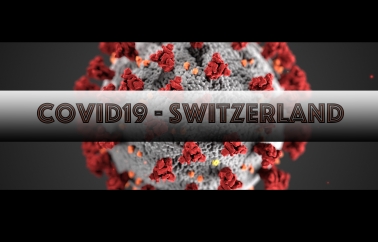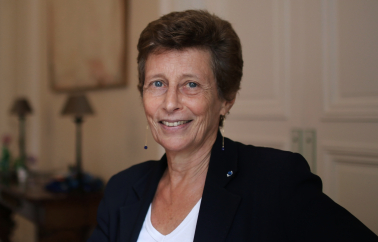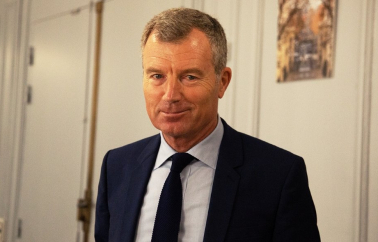
Feedback from Mr. BERDOZ, Prefect of the District of Riviera - Pays-d'Enhaut, the Canton of Vaud, regarding the COVID19 crisis management
Feedback by Mr. BERDOZ, Prefect of the District of Riviera - Pays-d'Enhaut, the Canton of Vaud, on the COVID19 crisis management
Today Switzerland forms, as you know, a federal state made up of 26 cantons.
The Federal Constitution of the Swiss Confederation mentions that the cantons are sovereign when their sovereignty is not limited by the Federal Constitution and exercise all rights that are not delegated to the Confederation.
This sovereignty is however limited when internal security is in danger because in this case the Federal Constitution gives to the Federal Council the power to issue ordinances and take decisions for the whole country. These ordinances must be limited in time, which is why at the time of writing of this text, (early September 2020) the Federal Chambers are debating a Covid-19 law allowing the Federal Council to continue the actions taken beyond the emergency declared in March 2020.
Although the field of health is part of cantonal sovereignty, in the case of Covid-19 and in application of this principle, the Confederation has, on the recommendations of experts from the FOPH - Federal Office of Public Health (OFSP in French) immediately imposed measures of social distancing, limitation of gatherings, border restrictions as well as the closure of businesses deemed non-essential (restaurants, bars, hairdressers, shops other than those of first necessity etc.). It was in fact a semi-lockdown imposed by the Federal Council through ordinances forcing the cantons to be flexible by adapting their own operating rules.
Many measures were immediately taken by those in charge of the health system and economic circles in order to guarantee access to care for all our population but also to quickly allocate funding necessary for the survival of employees and self-employed people affected by these restrictions. Prefects were not directly involved in these processes but they were asked to answer to legitimate questions that such a crisis situation may arise among the population and local authorities.
Regarding the adaptation of our own operating rules, the Canton of Vaud has, for example, issued a decree allowing the executives of local authorities to organize a postal ballot in order to allow the legislative power to take urgent decisions without meeting.
State territorial representatives, Prefects of the Canton of Vaud in this case, participated in different ways in the implementation of these new constraints. For example, these are three actions undertaken by members of the Canton of Vaud Prefectural body.
1: Presence of members of the Prefectural body (PB) in the Cantonal Action Headquarter (EMCC):
Text by Mr. Dessauges, Prefect of Gros-de-Vaud District
The Prefects of Vaud have been integrated into the Cantonal Action Headquarter (EMCC) on the following manner:
Mr. Pascal Dessauges, delegate of the Prefectural body in CodirOrca, at the EMCC since the beginning of the process.
Mrs. Anne Marion-Freiss, delegate of the Prefectural body for the heat wave plan, in the team of the system for the care of the deceased and the bereaved (NM cell).
Mrs. Clarisse Schumacher-Petoud in of the General Direction of social cohesion (DGCS in French) for the Solidarity center.
Since March 13, 2020, the presence of a member of the Prefectural body in the EMCC has provided an interface between this structure, the Prefectural body and the municipalities of Vaud.
Federal ordinances and the various decrees adopted by the Prefectural body during this period granted specific powers to the Prefects (in addition to the issue of schools mentioned below), in particular:
Repression of contraventions in case of violation of sanitary rules.
Notice on municipal notices adopted in urgent cases without a meeting.
Authorization for municipal councils to gather in compliance with health rules.
Many questions were addressed to us by the authorities of the communes; questions as diverse as the possibility of maintaining municipal meetings, the obligation or not to keep municipal administrations open and the need or not to continue to provide municipal services (roads, waste reception center, etc.), the opening or not of public spaces (playgrounds, docks, ports, sports places), the maintenance or reopening of markets in the municipalities or direct sales from the producer, the opening of shops (depending on their type of activity, etc. …).
Each of these questions was sent to the EMCC for response or transmission to the relevant department.
The members of the Prefectural body were regularly required to evaluate the situation of each municipality in their respective districts or to intervene to reopen a waste recycling center, access to docks, launching boats, etc. ...
As of Monday April 6, 2020, the members of the Prefectural body were invited to follow a training course since in the five regions selected in case of lockdown, a Prefect would have had the task of running the Commitment Control Post (PCE in French).
As of April 27, 2020, the 1st stage of easing measures entered into force. These measures met a need of the population, in particular concerning DIY, garden centers, nurseries, florists and vehicle washing stations.
A certain number of questions always arose in the prefectures, in particular regarding the conditions set for the reopening of these businesses, including hairdressing, beauty salons, etc.
Each of these questions was sent to the EMCC for response or transmission to the relevant department.
The members of the Prefectural body have had to intervene with certain municipalities to reopen the waste reception centers.
The Head of the EMCC has made us aware on several occasions that the relaxation of the measures taken according to the evolution of Covid_19 would make it much more difficult to check in public spaces and shops.
As of May 11, 2020, the 2nd stage of relaxing measures entered into force.
A number of questions still arose in the prefectures, in particular concerning the conditions set for the rerun of sports activities without physical contact and the reopening of restaurants, bars and pubs.
Each of these questions was sent to the relevant department with a copy to the EMCC for information.
We have also been asked to control health measures on the occasion of the reopening of compulsory cycle schools.
As of June 6, 2020, the 3rd stage of relaxation of measures entered into force.
The members of the Prefectural body continued their information activities with the municipalities as needed and according to the modalities in force since March 13, 2020.
Functions report:
The activity of the members of the Prefectural body during this period of Covid_19 was intense, especially in terms of contacts or exchanges between us as well as with the EMCC, the cantonal services and the municipalities.
The main difficulty lay in being able to constantly inform the commune authorities or answer their many questions when the situation might change from day to day.
It is important to note the relevance of the role of Prefects in this crisis situation. Indeed, their depth knowledge of the field (sensitivity of a particular service, municipality, administration, population, etc.) makes them ambassadors who are listened to. This reinforces the message distilled by the political authorities. In fact, we were reachable and available 24 hours a day, 7 days a week.
The office of the Prefectural body, and more specifically our President, were called upon in the numerous consultations carried out by the various partners when drafting orders or directives. The Prefects were also empowered to pronounce fines within the meaning of art 13 of the federal COVID-19 special situation ordinance.
Finally, they are responsible for ensuring the application of health rules for the municipal councils. They have been asked to advise regarding postal votes in the councils and have a general supervisory role in the implementation of cantonal decisions.
For the EAST region, the 4 Prefects participated 3 times a week from March 16 in the East Command Post crisis report which brought together the various field workers, Prefectural body, Police, Firefighters, Ambulance, Health Service, Presidents of CODIR Prefectural body.
These reports have been very useful for the liaison, coordination and implementation of the directives of the State Council, both with communes (municipalities, general and communal councils, administration) as well as with businesses and individuals.
The latest report was done on June 10.
This decentralized structure could be renewed if necessary and has proved its usefulness.
The measures taken to contain the development of this pandemic have been exceptional, as have the management and decision-making processes.
Most of the municipal authorities were surprised by this mode of operation due to the health situation and it could prove useful to provide information on these issues at the start of each legislature.
2 : Solidarity center:
Text by Mrs. Schumacher-Petoud, Prefect of Lausanne District
The context of the Coronavirus pandemic and the lockdown decision put the most vulnerable people in a situation of isolation: in accordance with the authorities' prescriptions, they had to stay at home, limit their outings as much as possible and avoid contact.
However, compliance with this strict framework could create a problem for a part of the population who, in their daily life, no longer have sufficient autonomy to perform certain essential activities such as shopping, making payments or walking their dog.
The canton, through the general direction of social cohesion (GDSC), in collaboration with the Vaud association of help and home care (AVASAD), has organized itself to offer effective responses to requests for these persons.
Thanks to close collaboration between the Cantonal Action headquarter and the Prefects, the municipalities were able to quickly give a coordinated response to the social emergency on the ground.
This mechanism, called the Solidarity center, was designed to respond quickly and effectively to citizens.
As the citizen in our canton is accustomed to contacting his municipality of residence in case of problem, the Solidarity center has followed this reality. Thus, initially, it was the municipalities that took charge of the requests of their inhabitants through their network, in particular voluntary (scout, youth, etc.).
If a municipality did not have the means to respond to a request (for example payments, transport for disabled people, support for a family caregiver), it could call on the Solidarity center via a free dedicated telephone number created for this purpose.
On the other side of the phone, a team of social workers was able to direct requests to a partner (Pro Senectute for the elders, Pro Infirmis, the Red Cross, Caritas for the underprivileged) able to provide an adequate response to a raised problem.
The idea was thus to combine the resources of the municipalities and those of the cantonal associations, which have a global vision of the Vaud social system, to respond quickly to demand.
During the lockdown, and through the intermediary of the territorial representatives who played a real role of transmission between the municipality and the State, the municipalities were able to give the Vaud population access to effective support thanks to the coordination of resources of the various social partners.
This experience made it possible to set up cross-functional work between the various associative partners (seniors, disabled, destitute, etc.) who collaborated together to share their respective expertise and respond with one voice to the needs of the most vulnerable.
Thus, the Solidarity center has made it possible to bring together the social world around a table. This experience is undoubtedly an opportunity to perpetuate the coordination of associative partners and thus improve the effectiveness of Vaud social policy thanks to the intermediary of the Prefects who allow rapid transmission of information on the entire territory.
3: Support system for the deceased and the bereaved (NM cell):
Text by Mrs. Marion Freiss, Prefect of Ouest Lausannois District
Regarding the NM cell, it was made up of a registrar, delegates from religious communities, the head of incineration from the City of Lausanne, and police officers. It was co-chaired by the Commissioner of the Canton of Vaud Police and the Deputy Cantonal Doctor. The members of this team met daily from March 23, 2020 until the Easter holidays to take stock of the situation. Then the meetings were spaced twice a week until early June and then once a week on average until early July.
The mission of the cell was to assess the possibility of a sharp increase in deaths linked to the Covid19 pandemic linked to the needs in terms of burial or cremation, to support the families of deceased persons for whom the funeral rites were upset and who had not been able to accompany their loved ones at the end of their life. It was also a question of settling the repatriation of the deceased to their country of origin while the borders were closed.
To achieve these objectives, monitoring in the form of an application was made available to funeral directors, personalized telephone support was offered to bereaved families in partnership with religious communities, and finally the creation of a cantonal morgue was planned in order to face with dignity if necessary the needs of welcoming deceased persons awaiting funerals.



